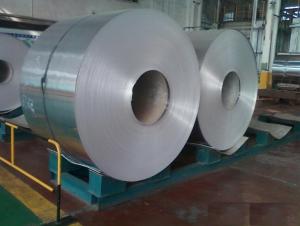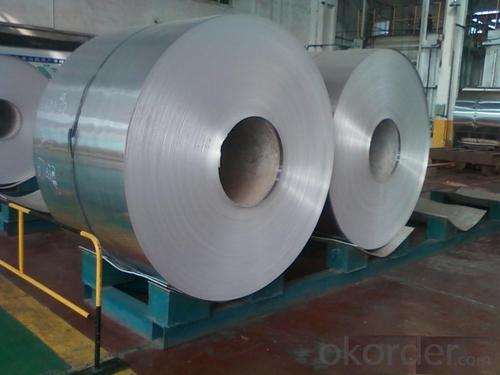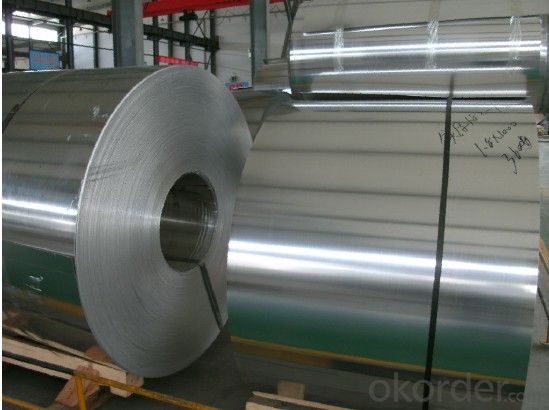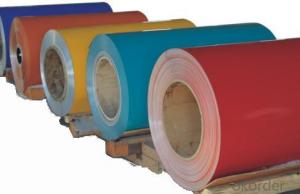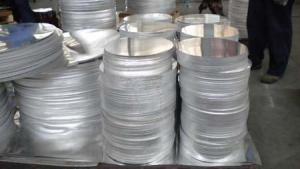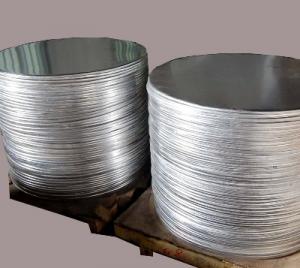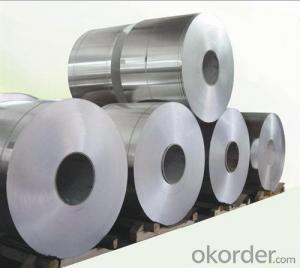Bronze Aluminum Coil Stock for Cookware and Re-Rolling
- Loading Port:
- Shanghai
- Payment Terms:
- TT or LC
- Min Order Qty:
- 5 m.t.
- Supply Capability:
- 50000 m.t./month
OKorder Service Pledge
OKorder Financial Service
You Might Also Like
.1.Structure of Aluminium Coil and Sheet for Cookware and Re-rolling
Aluminium Coil and Sheet for Cookware and Re-rolling is one semi-finished aluminium material. This strip can be rolled down to aluminium coil,sheet,circle ect. The alloy AA1050 is widly used in building, industry ect. Its weight is much lower than steel. So many customers choosed aluminium material instead of steel.
2. Main features of Aluminium Coil and Sheet for Cookware and Re-rolling
a.Competitive price---We have our own mills and can produce mill finished aluminium coils, so we can control the production cost better.
b.Professional after-sale service---We have more than 15 years exportation experience and you need not worry about the exporation problems.
c.Fast delivery time---We can control the delivery time within 35 days.
3. Image
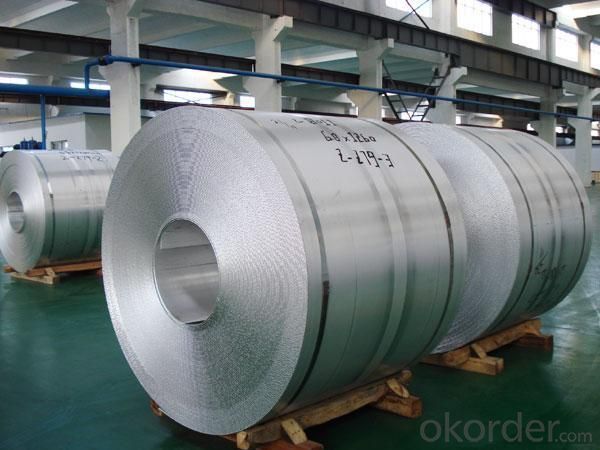
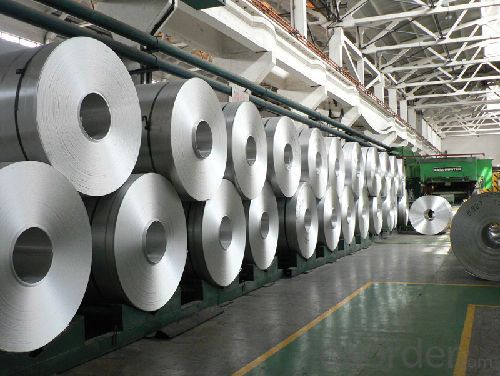
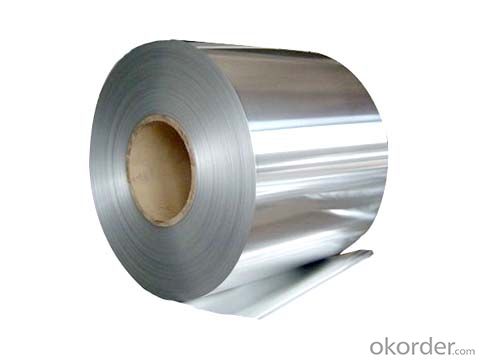
| Alloy | Temper | Thickness | Width | Weight |
| AA1050 | H14 | 0.2-3MM | 900MM-1800MM | About 2 tons |
5.FAQ:
What is the quality standard?
---Usually our standard is GB3880-2006
What is the largest width?
---It is 2300mm
What is the MOQ?
---Usually we can accept 80 tons.
- Q: This question asks for the distinctions between two types of metal coils: aluminum and iron.
- <p>Aluminum coil and iron coil differ in several aspects. Aluminum coil is lightweight, corrosion-resistant, and has good electrical conductivity, making it ideal for applications like electrical wiring and packaging. Iron coil, on the other hand, is heavier, stronger, and more magnetic, commonly used in construction and manufacturing for reinforcement and structural support. Additionally, iron is more prone to rust compared to aluminum, which is more resistant to corrosion. The cost and availability of these materials also vary, with aluminum being more abundant and less expensive than iron.</p>
- Q: Can aluminum coils be used for aerospace applications?
- Indeed, aerospace applications can make use of aluminum coils. Aluminum, renowned for its exceptional blend of lightweightness, strength, and resistance to corrosion, is widely employed in the aerospace sector. Aluminum coils play a vital role in fabricating diverse components and structures essential to aerospace applications, encompassing aircraft frames, wings, fuselages, and engine parts. By utilizing aluminum coils, the overall weight of the aircraft is reduced, thereby enhancing fuel efficiency and boosting performance. Furthermore, the malleability, weldability, and machinability of aluminum coils make them well-suited for the intricate shapes and structures demanded in aerospace engineering.
- Q: aluminum welding
- Impossible. You need a TIG welder with AC and high frequency. Although you CAN use solid wire MIG with 100% argon shield gas, this is not a job for amateurs. MIG welding aluminum requires professional-grade equipment and several years experience with welding.
- Q: How do aluminum coils contribute to the sound insulation of buildings?
- The unique properties and applications of aluminum coils contribute significantly to the sound insulation of buildings. Being lightweight and flexible, aluminum can be easily shaped into coils, making it an excellent choice for sound insulation purposes. One way in which aluminum coils contribute to sound insulation is by serving as a barrier that prevents the transmission of sound waves. When installed in walls, ceilings, or floors, these coils create an additional layer that effectively blocks and absorbs sound energy. Due to its high density and rigidity, aluminum can reflect and absorb sound waves, thus reducing their intensity as they pass through the building structure. Moreover, aluminum coils can be combined with other soundproofing materials, like foam or fiberglass, to enhance their sound absorption capabilities. By working in conjunction with these materials, aluminum coils create a more comprehensive sound insulation system that traps and dampens sound waves. Another advantage of aluminum coils is their resistance to moisture and corrosion, which makes them suitable for both indoor and outdoor applications. This durability ensures that the sound insulation provided by aluminum coils remains effective over time, even in harsh environments. Additionally, aluminum coils are easy to install and maintain, making them a cost-effective solution for sound insulation in buildings. Their lightweight nature allows for effortless transportation and handling, while their flexibility enables them to be installed in various positions and configurations. To summarize, aluminum coils play a crucial role in sound insulation by acting as a barrier, reflecting and absorbing sound waves, and providing durability and versatility. Their combination with other soundproofing materials further enhances their effectiveness. With their lightweight and flexible properties, aluminum coils offer a practical and cost-effective solution for improving the acoustic performance of buildings.
- Q: What are the vibration damping properties of aluminum coils?
- Aluminum coils possess exceptional properties for damping vibrations, rendering them an optimal option for a variety of applications necessitating vibration control. With their remarkable rigidity and low weight, aluminum coils effectively absorb and dissipate vibrations, diminishing both the magnitude and frequency of oscillations. This capacity for vibration damping proves to be advantageous in sectors like automotive, aerospace, and electronics where minimizing vibration plays a pivotal role in enhancing performance, durability, and overall user satisfaction. Moreover, the ability of aluminum coils to dampen vibrations aids in reducing noise levels, resulting in quieter operations and environments. In essence, the vibration damping properties of aluminum coils contribute to enhanced product performance, heightened safety, and improved user comfort.
- Q: Are there any environmental benefits to using aluminum coils?
- Yes, there are several environmental benefits to using aluminum coils. Firstly, aluminum is a highly sustainable material as it is 100% recyclable without losing its original properties. This means that using aluminum coils helps reduce the demand for mining and extracting new raw materials, reducing the environmental impact associated with these processes. Additionally, recycling aluminum requires only about 5% of the energy needed to produce primary aluminum, resulting in significant energy savings and reduced greenhouse gas emissions. Moreover, aluminum coils have a longer lifespan compared to other materials commonly used in coils, such as copper or steel. This durability means that fewer coils need to be manufactured and replaced over time, resulting in less waste generation and lower overall environmental impact. Furthermore, aluminum is corrosion-resistant, which eliminates the need for additional treatments or coatings that may contain harmful chemicals. This reduces the release of potentially hazardous substances into the environment during the manufacturing and use of aluminum coils. Lastly, aluminum is lightweight, which contributes to lower transportation costs and energy consumption during distribution. This aspect decreases fuel consumption and associated emissions, reducing the overall carbon footprint of using aluminum coils. Considering these factors, the use of aluminum coils provides significant environmental benefits, including reduced resource extraction, energy conservation, waste reduction, and lower emissions.
- Q: I have a electrical project to do, and could save about $300.00 by using aluminum wire since I can get it free, but I have never used aluminum before, and am not sure if it is a good way to go.
- I would not recommend it. Aluminum wire expands and contracts a great deal causing the connections to become loose, or break. That is what I was taught.
- Q: How are aluminum coils used in packaging?
- Aluminum coils are widely used in packaging due to their excellent properties and versatility. These coils are usually made from aluminum alloy, known for its lightweight yet strong characteristics. One common application of aluminum coils in packaging is in the production of aluminum cans. The coils are rolled into thin sheets, which are then formed into cans of various shapes and sizes. The lightweight nature of aluminum makes it ideal for manufacturing cans that are easy to transport and handle, reducing overall packaging weight. Aluminum coils are also used in the production of flexible packaging materials such as foils and laminates. These materials are commonly used for packaging food products, pharmaceuticals, and other perishable goods. The flexibility of aluminum allows it to be easily shaped and formed into different packaging formats, ensuring efficient and convenient use. Another important use of aluminum coils in packaging is in the production of closures and bottle caps. Aluminum closures provide an airtight seal, protecting the contents of the package from external factors such as moisture, contaminants, or oxidation. Additionally, aluminum closures can be easily opened and closed, providing convenience to consumers. Furthermore, aluminum coils are employed in the production of blister packs, which are widely used in the pharmaceutical industry. Blister packs consist of a plastic sheet with aluminum foil lamination, creating a barrier against moisture, light, and oxygen. This packaging format ensures the integrity and safety of pharmaceutical products by protecting them from degradation or contamination. In summary, aluminum coils are extensively used in packaging due to their lightweight, strength, and versatility. These coils are transformed into various packaging formats such as cans, flexible foils, closures, and blister packs, providing durability, protection, and convenience to both manufacturers and consumers.
- Q: Explain the differences between aluminum coil and aluminum foil when used in food packaging.
- <p>Aluminum coil and aluminum foil are both used in food packaging but serve different purposes. Aluminum coil is typically thicker and more rigid, used for making aluminum cans and containers. It provides a strong barrier against light, air, and moisture, which is crucial for preserving the quality and freshness of food. Aluminum foil, on the other hand, is thinner and more flexible, often used for wrapping food to protect it from contamination and to retain heat or cold during cooking or storage. It's also used for baking and roasting to prevent food from sticking to the pan or to add a crispy texture. While both materials are recyclable and provide a barrier against external elements, their specific applications in food packaging differ based on their physical properties and the needs of the packaging process.</p>
- Q: This question asks about the distinctions among various grades of aluminum coils, likely referring to their properties and uses.
- <p>Aluminum coils are differentiated by grades based on their alloy composition, thickness, and specific applications. Common grades include 1000 series (99% pure aluminum, soft and malleable), 3000 series (aluminum-manganese alloys, good for cooking utensils), 5000 series (aluminum-magnesium alloys, used in marine applications), and 6000 series (aluminum-magnesium-silicate alloys, known for strength and used in construction). Each grade has distinct properties such as strength, formability, and corrosion resistance, which determine their suitability for different industries and applications.</p>
Send your message to us
Bronze Aluminum Coil Stock for Cookware and Re-Rolling
- Loading Port:
- Shanghai
- Payment Terms:
- TT or LC
- Min Order Qty:
- 5 m.t.
- Supply Capability:
- 50000 m.t./month
OKorder Service Pledge
OKorder Financial Service
Similar products
Hot products
Hot Searches
Related keywords
